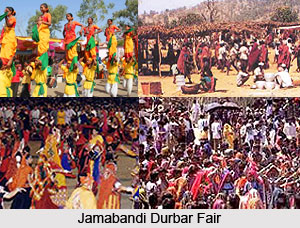 Importance of Dangs Darbar says the rich tribal history of Dang Tribal community of the Saputara region of Western Ghats Mountain Range.
Importance of Dangs Darbar says the rich tribal history of Dang Tribal community of the Saputara region of Western Ghats Mountain Range.
Dangs Darbar or Jamabandi Durbar Fair is a three-day annual cultural gala coinciding with the Holi festivities.
Celebration of Dangs Darbar
Jamabandi Durbar Fair or Dangs Darbar is celebrated in the Dang district which is located in the Saputara Hills region. A conspicuous festival of Dang tribe, inhabitants of wooded region Saputara, the Dang Darbar is celebrated just few days before Holi. The exact venue of this festival is Ahwa near Saputara but the festival has drawn its name from the Ahwa Darbar, a one–time venue assembly (Darbar) venue for English ministers and mandarins during the rule of British East India Company in India. Now, the name has been changed to Jamabandi Durbar and the District Collector officiates at it.
Tribal Functions of Dangs Darbar
A large number of tribal inhabitants and visitors come to attend one of the most colourful and attractive festivals of the Dangs Darbar during this festival. The sight transforms to bright and gung from dry and serene. A galore of men and women attired in riots of colour are seen agog with festivities during the Dangs Darbar.
Music Instruments of Dangs Darbar
The Nomad tribes carry a shehnai (wood-wind instrument) and other musical instruments with them.
Costumes in Dangs Darbar
All tribal men wear loin clothes which are complimented with a waistcoat and coloured turban. Women are robed in saree and blouses with heavy silver jewellery. The carnival ground can be seen abuzz with activities and merchants who come to sell their products. Dang Darbar, a three day festival, witnesses many activities like folk dances, Raas, Garba programs, songs and dramas. It also provides a platform to search for brides and grooms.
Cultural Fest in Dangs Durbar
An exhibition of local culture, tribal development schemes and forest environment is inaugurated on the occasion during the festival. During the festival, the customs instituted earlier still continues - to provide pensions to the Tribals (Daher, Gadhvi, Linga, Pimpri and Vasurna were awarded pensions in 2009). Various other schemes are implemented like the `Malki Plantation` scheme in which tribals grow teakwood and other forest products in their land, for which are paid by Govt under the scheme. Another scheme, `Mafi Kaat` - about 225 tribals were provided with teakwood worth Rs 22.5 million free of cost to build and repair their own houses.



















